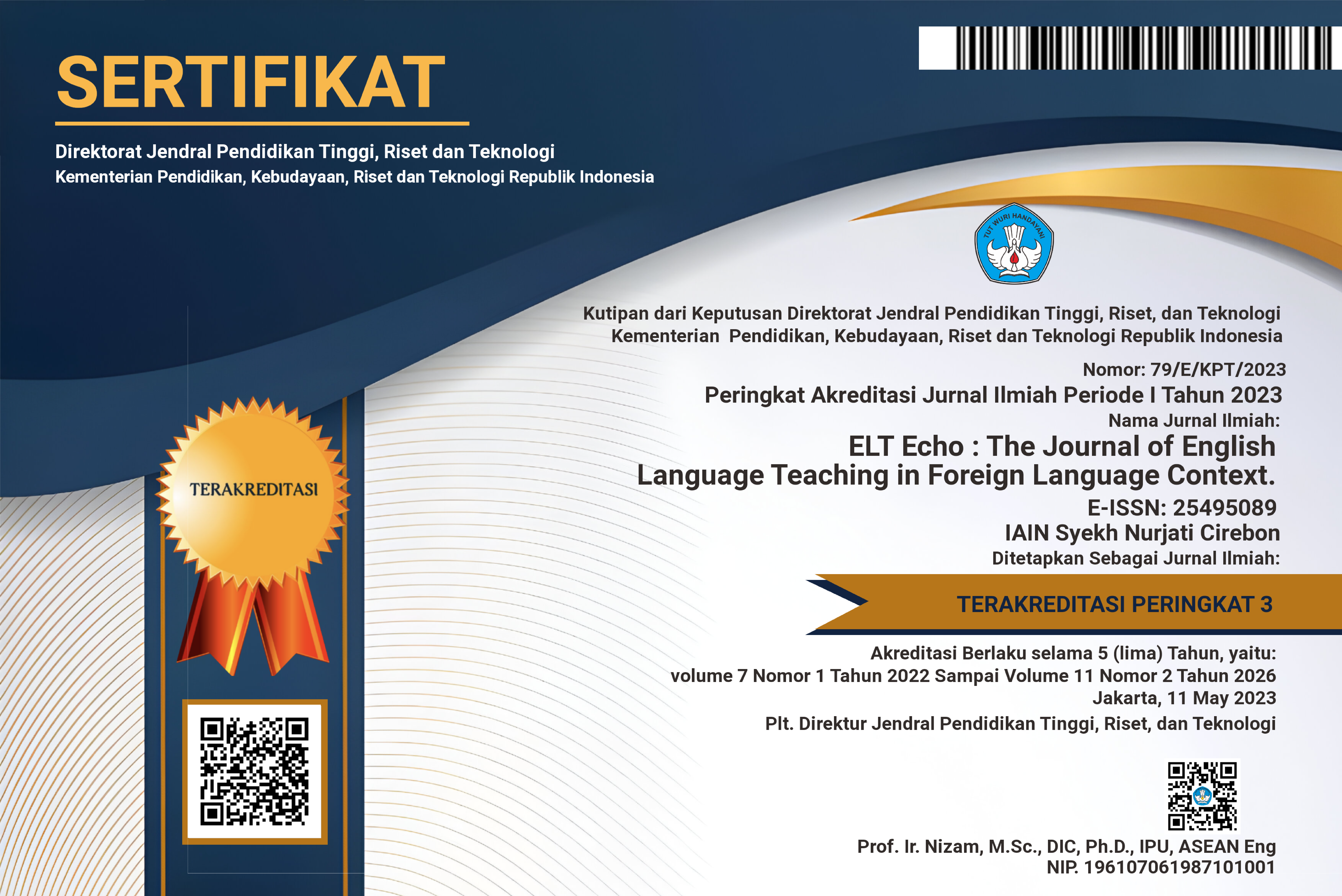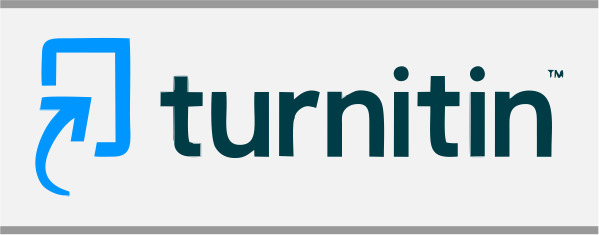CONTINUING PROFESSIONAL DEVELOPMENT ACTIVITIES FOR ENGLISH TEACHERS
(1) IAIN Syekh Nurjati Cirebon
(*) Corresponding Author
Abstract
Abstract: Teachers’ quality plays a paramount role in the improvement of quality of education. A way to ensure high quality teachers is through effective continuous professional development for teachers. This present study is aimed to explore how the EFL teachers develop their professionalism particularly in terms of pedagogical and professional competencies. The result shows that there are three main themes of professional development pursuits of EFL teachers comprising of self-initiated or individual, institutional, and non-institutional professional development activities.
Â
Â
Keywords: continuing professional development, EFL teachers, pedagogical competency, professional (subject matter) competency
Full Text:
PDFReferences
References
AL-Wreikat, Y., & Abdullah, M. 2010. An Evaluation of Jordanian EFL Teachers’ In-service Training Courses Teaching Techniques Effectiveness. English Language Teaching, 3(4), 18-27.
Amin, M. 2013. What Makes Teachers of EFL Professional or Unprofessional. Dissertation, Department of English Language Education, Graduate Program of State University of Malang.
Anugerahwati, M. & Saukah, A. 2010. Professional Competence of English Teachers in Indonesia: A Profile of Exemplary Teachers. Indonesian Journal of English Language Teaching, 6 (2), 107-117.
Anugerahwati, M. 2009. Professional Competence of English Teachers in Indonesia: A Profile of Exemplary Teachers. Dissertation, Department of English Language Education, Graduate Program of State University of Malang.
Brown, D. 2007. Teaching by Principles: an Interactive Approach to Language Pedagogy (3rd Ed). Englewood Cliffs, N.J.: Prentice-Hall
Chan, G. 2011. The Professional Development of Pre service Teachers in a Postgraduate Diploma in Education Program. Practice and Theory in Systems of Education, 6(2), 185-196.
Davidson, G., Dunlop, F., Soriano. D H., Kennedy, L., & Philips. T. 2012. Going forward: Continuing Professional Development for English Language Teachers in the UK. British Council.
Harun, M. and Al-Amin, S. 2013. Continuous Teacher Development through Reflective Teaching and Action Research. Bangladesh Research Publications Journal, 8 (1), 69-78.
Hussein, R. 2014. A Profile of Exemplary Teachers of English for Young Learners at the Elementary Schools. Jurnal Pendidikan Humaniora, 2(4), 311-321.
Johnny, J. 2009. Ways to Continuing Professional Development. www.teachingenglish.org.uk/articles/ways-continuing-professional-development, retrieved in April 2012.
Johnson, E., & Golombek, R. 2011. Research on Second Language Teacher Education: A Sociocultural Perspective on Professional Development. New York: Routledge.
Karimi, N. 2011. The Effects of Professional Development Initiatives on EFL Teachers’ Degree of Self Efficacy. Australian Journal of Teacher Education, 36(6), 50-62.
Kasi, F. 2011. Collaborative Action Research: An Alternative Model for EFL. The Asian EFL Journal Quarterly, 12(3), 98-117.
Kazemi, A., & Ashrafi, M. 2014. In-Service Training Programs for Iranian EFL Teachers Revisited. International Journal of Asian Social Science, 4(10), 1062-1076.
Khan, A. 2011. Professional Development of English Teachers: The Saudi Arabian Context. Interdisciplinary Journal of Contemporary Research in Business, 3(2), 1583-1591.
Kolo, C. 2006. Portrait of a Good EFL Teacher: A Study on Teachers’ Perspectives. Dissertation, Department of English Language Education, Graduate Program of State University of Malang.
Lay, C. 2010. EFL Teacher Workshops on Classroom Management and Increasing Classroom Interaction in Cambodia. Paper presented in E-Teacher Professional Development Workshop University of Maryland Baltimore County and University of Oregon.
Lee, I. 2011. Teachers as Presenters at Continuing Professional Development Seminars in the English as a Foreign Language Context: ‘I find it more convincing’. Australian Journal of Teacher Education, 36(2), 30-42.
Liando, N. 2010. Students’ Vs. Teachers’ Perspectives on Best Teacher Characteristics in EFL Classrooms. TEFLIN Journal, 21(2),118-136.
Mann, S. 2005. The Language Teacher’s Development. Language Teaching. 38, 103–118. Cambridge: Cambridge University Press.
Meng, J & Tajaroensuk, S. 2013. The Workshop in the Multilayered Peer Coaching Model for Tertiary EFL Teachers’ In-Service Professional Development. English Language Teaching, 6 (8), 44-53.
Murray, D. & Cristinson, M. 2011. What English Language Teachers Need to Know Volume I - Understanding Learning. New York: Routledge.
Murray, A. 2010. Empowering Teachers through Professional Development. English Teaching Forum 1, 2-11.
Mustofa, M. 2011. Professional Development of EFL Teachers at Vocational schools. Dissertation, Department of English Language Education, Graduate Program of State University of Malang.
Olofsson, A. 2010. Discussions in Online Learning Community Forums- Do They Facilitate Teachers Professional Development?. The University of the Fraser Valley Research Review, 3(2), 54-68.
Pani, S. 2006 Teacher Development through Reading Strategy Instruction: The Story of Supriya. TESL-EJ 10(2), 1-21.
Ramadhani, N., Ancok, D., Swasono, Y., & Suryanto, P. 2012. Teacher Quality Improvement Program: Empowering Teachers to Increasing a Quality of Indonesian’s Education. Proceeding of International Conference on Education and Educational Psychology. Istanbul, Turki. 10-13 October 2012.
Raza, N. 2010. The Impact of Continuing Professional Development on EFL Teachers Employed in Federal Universities in the United Arab Emirates. Unpublished Dissertation, The University of Exeter.
Richards, J. & Farrell, T. 2005. Professional Development for Language Teachers. Strategies for Teacher Learning. Cambridge: Cambridge University Press.
Riding, P. 2001. Online Teacher Communities and Continuing Professional Development. Teacher Development, 5(3),283-295.
RodrÃguez, A & McKay, S. 2010. Professional Development for Experienced
Teachers Working With Adult English Language Learners. The U.S. Department of Education, Office of Vocational and Adult Education.
Salazar, D., Muñoz, Z., Fox, K., & Lucas, L. 2010. On-line Professional Learning Communities: Increasing Teacher Learning and Productivity in Isolated Rural Communities. Systemics, Cybernetics and Informatics, 8(4), 1-7.
Saleh, S. & Pretorius, F. 2006. English as a Foreign Language: Teachers' Professional Development via the Internet. Progressio, 28, (1&2) 111-126.
Simegn, B. 2014. EFL Teachers’ Self-Initiated Professional Development: Perceptions and practices. Academic Journal, 9(21), 1109-1114.
Su, T., Yang, Y., & Hsioa, Y. 2010. The Strategies of Professional Development for the EFL Teachers in Elementary Schools. Journal of Management Science & Statistical Decision, 7(4), 1-14.
Tasker, T. 2011. Teacher Learning through Lesson Study: An Activity Theoretical Approach toward Professional Development in the Czech Republic. In K. E
DOI: 10.24235/eltecho.v2i1.1592
Article Metrics
Abstract view : 964 timesPDF - 489 times
Refbacks
- There are currently no refbacks.
Â
This Journal is indexed by:
Â

This work is licensed under a Creative Commons Attribution 4.0 International License.










